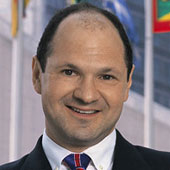The US Democrats’ Failing Turnaround Strategy
Trumpism, like most radical right-wing movements, is fueled by resentment, not economics. Trump voters are like Russians voting for Putin.
July 28, 2017
In the latest twist of the Democrats in the United States trying to make political hay of the mess that is Donald Trump, they are now pursuing a new tack.
They are explaining to Trump supporters how the Trump agenda will hurt their economic interests — by depriving them of health insurance and cutting social services in order to cut taxes for the rich.
However, with that strategy, the Democrats are getting nowhere: Nearly 40% of all voters continue to give their unwavering support to Trump. Moreover, in 17 Southern and Rust Belt states that are crucial for electoral calculations in the next presidential election as well as for controlling the Senate, his approval rating is above 50% according to a Gallup survey.
Surprised Democrats
The Democrats are surprised. They still believe in the old adage that people vote their pocketbook and expect voter’s eyes to open the moment they start hurting.
It is quite astounding that Democrats believe that. After all, the U.S. working class stands apart from most working-class voters in other democracies. In the latter, these folks vote their economic interests, while in the United States, they do not.
To a large extent, they vote on aspiration (affiliation with the Republicans offers them the lure of feeling to belong to a richer set of voters – even if their own economic circumstances are quite depressed).
Misunderstanding voter motivation
The other fundamental truth the Democrats miscomprehend is that Trumpism, like most radical right-wing movements, is fueled by resentment, not economics.
The resentment is not an exclusively American phenomenon — or Anglo-Saxon, if you add Brexit. All over the world people with old-time manual skills and traditional way of life are raging against their national elites who are completely at home in the complex globalized, information-driven world.
Trump voters are resentful like the Russians
This is exactly what is happening in Russia. Vladimir Putin has placed his cronies, a clique of former security officers, in all the relevant positions of power. By doing so, he has turned Russia into a kleptocratic filling station. Russia’s globalized elites — especially those who can find jobs abroad — are emigrating.
Putin, to use the Russian slang word meaning a lumpenized street thug, is a quintessential gopnik. Gopniks gather into gangs, respect the authority of a strong leader and like to pick on people under the direction of their leader. They resent “polite society” and accepted norms of conduct.
Trump’s supporters are mostly American versions of Putinesque thugs (gopniks), which can be readily seen by their conduct at his rallies. They like Putin because they feel they instinctively have more in common with him than with the American liberal elites and domestic media.
Trump supporters like Trump (as they would Putin) because he gives them license to voice their resentment of their own elites, as well as minorities, gays, foreigners and women.
Racist and sexist remarks, booing of national leaders and chants “Lock her up” have become acceptable. They prize their freedom of speech — or rather license — “to say what they really think” much more than their economic well-being.
The Russia/Putin/US healthcare connection
This is why so many Republicans in Congress have no fear of voting for Trumpcare — and for the Trump tax reform for the rich at the expense of his supporters.
The Democrats’ attempts to appeal to the self-interest of Trump supporters have not worked — in the same way that such economics-based opposition to Putin didn’t work in Russia.
To rational minds, that is all the more surprising since Putin’s gopnik policies since 2014 have plunged many Russians back into poverty.
A serious deterioration of US society
There is an even smaller chance of them working in the United States. After all, a majority of Trump supporters have enough money to stuff themselves mindlessly and get ever fatter — with enough left over to feed an opiate habit and even purchase laxatives for opiate-induced constipation.
Sure, there will be discontent when Americans get as impoverished as they got during the Great Depression, or as scared of impoverishment as they got in 2008.
But the Democrats will have to wait for a good long time for this to happen, and as long as it is not happening their economics-based rhetoric will continue to fall on the deaf ears.
Instead, they should remind Trump’s electorate that an envisioned (for now still behind the scenes, Trump clan focused) alliance with Russia will likely end in a serious fallout. (The late 1930s alliance between Germany and the Soviet Union didn’t end so well…)
The long game
Under the circumstances, the Democrats are probably forced to play a long game. They should drum into the American public the idea that an authoritarian, undemocratic regime of the type Trump supporters are clamoring for, and which the Republicans are rapidly building, has a tendency to rot.
Where a vitriolic insistence on strong-man rule can lead a society we can see every day in Venezuela, which is in a full state of collapse.
When the core is rotten, Americans won’t be able to hide behind their military might or huge aircraft carriers like the USS Gerald Ford which Mr. Trump has just commissioned. The Soviet Union, to use one example, had the world’s most formidable military when it suddenly disintegrated.
This grim picture may be a more effective way in engaging Trump supporters than to keep explaining to them how they will be worse off economically.
Unless, of course, that they are already so destitute that they want to do to the United States what many of them do to their personal lives already – mindlessly stuffing themselves and drugging up their constant despair.

